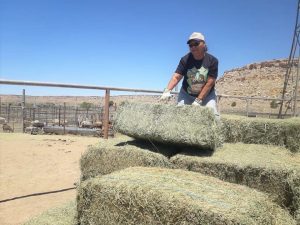August 24, 2020
Indian Country has been particularly hard hit by the impact of the COVID-19 crisis, but few people have been better positioned to provide assistance than Tribal Extension agents. As local leaders in the Federally Recognized Tribes Extension Program (FRTEP), these individuals have gone to great lengths to respond to the greatest needs on reservations across the country. From distribution of emergency food supplies and protective facemasks to helpful videos on how to make hand sanitizer and successfully grow your own food, extension agents have been a vital resource for Indian people, tribal leaders and government agencies.
Although the numbers are difficult to quantify, there is no doubt that much of Indian Country has been hit harder by the coronavirus than the majority of the nation. The combined impact of poverty, large numbers of individuals with pre-existing medical conditions, and inadequate medical facilities has been devastating.
“The medical systems are easily overloaded and there have been a lot of deaths,” said Trent Teegerstrom, Director of Tribal Extension at the University of Arizona, whose program serves seven different reservations. “For smaller tribes, the number of deaths has been more impactful as a whole because the population is small and everybody knows everybody. We lost one of our 4-H leaders and the tribes have lost cultural and language people. It has changed the way ceremonies and funerals are done and the people are trying to figure this all out. It’s just a complete paradigm shift.”
Fortunately the FRTEP agents have been able to provide assistance. Some have distributed masks through food banks, soup kitchens and crisis shelters. Others have provided cloth and sewing materials so students in 4-H programs could make masks. At Hualapai there was no hand sanitizer available so FRTEP agents created a video to help community members make their own. Some agents distributed latex gloves and other Personal Protective Equipment (PPE) to tribal communities while others organized the acquisition and distribution of emergency supplies of hay, firewood and food. In Alaska, the Bristol Bay tribal extension program has distributed more than 4,000 meals to youth and 3,000 pounds of produce to elders in remote communities.
“The networks we have with tribes and the USDA (U.S. Department of Agriculture) has been critical, and the relationships that have been built up over time have been integrated into a lot of the efforts taking place,” Teegerstrom explained.
Tribal extension agents have been working in conjunction with government agencies, non-profit organizations and corporations to coordinate logistics for emergency aid to tribal communities. “There has been a lot of collaboration,” Teegerstrom said. “One of the important aspects has been having that one person as a point of contact with the tribes. This situation really highlights the importance of maintaining that.”
Because of the way the FRTEP programs are funded on a two-year cycle of competitive grants, it can be difficult to ensure continuity of programming and personnel. That needs to change, not only to meet the short-term needs created by the COVID-19 crisis but the ongoing needs of the communities, as well. Even during the height of the pandemic response, agents are still serving farmers and ranchers, tribal youth and tribal communities with socially-distant services. Demand for information on how families can grow their own food has been greater than ever, programming for children and teens has been adapted for online delivery, and agents are finding new ways to communicate with stakeholders.
“This crisis has actually brought to life just how critical extension agents and programs are for the tribes,” Teegerstrom said. “We have known for a long time how important it is to have someone in there who has the education and access to the resources that tribes need. Now the USDA and others are finally realizing the importance of that, too.”
Examples of Tribal Extension activities
Examples of the work being done by FRTEP extension agents can be found on the various project pages. Click the links below for specific examples.
- Bristol Bay (Alaska)
- San Carlos Apache (Arizona)
- Hopi (Arizona)
- Seminole (Florida)
- Bay Mills (Michigan)
- Pawnee (Oklahoma)
